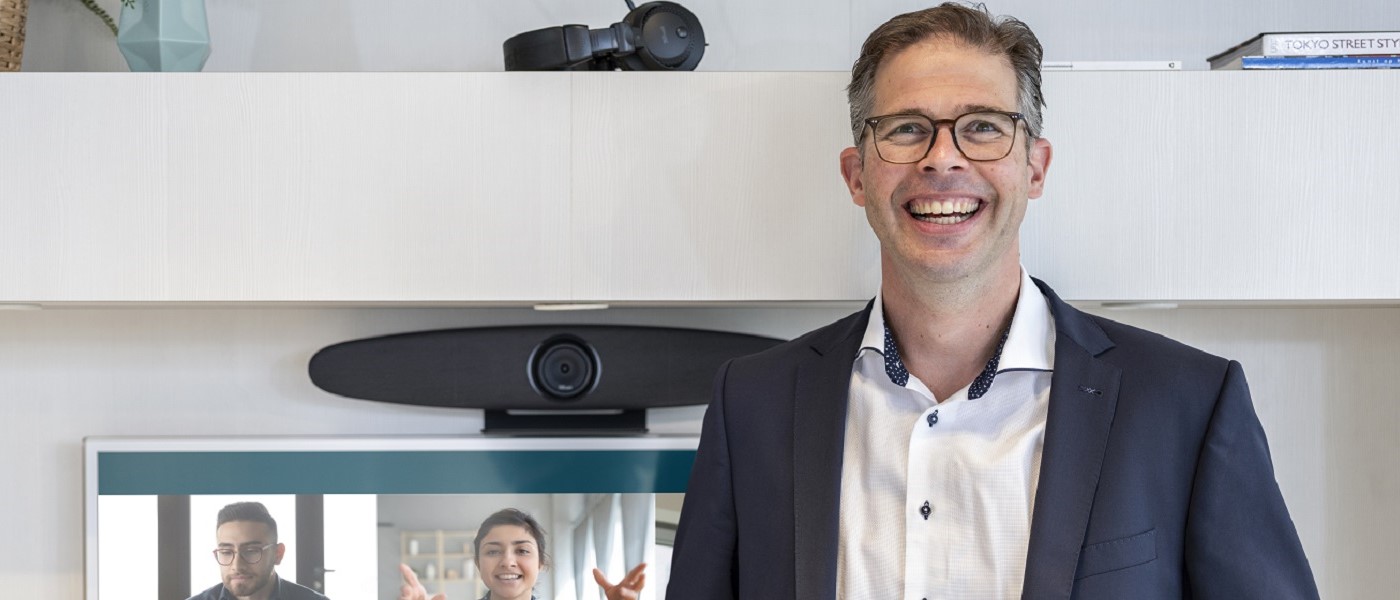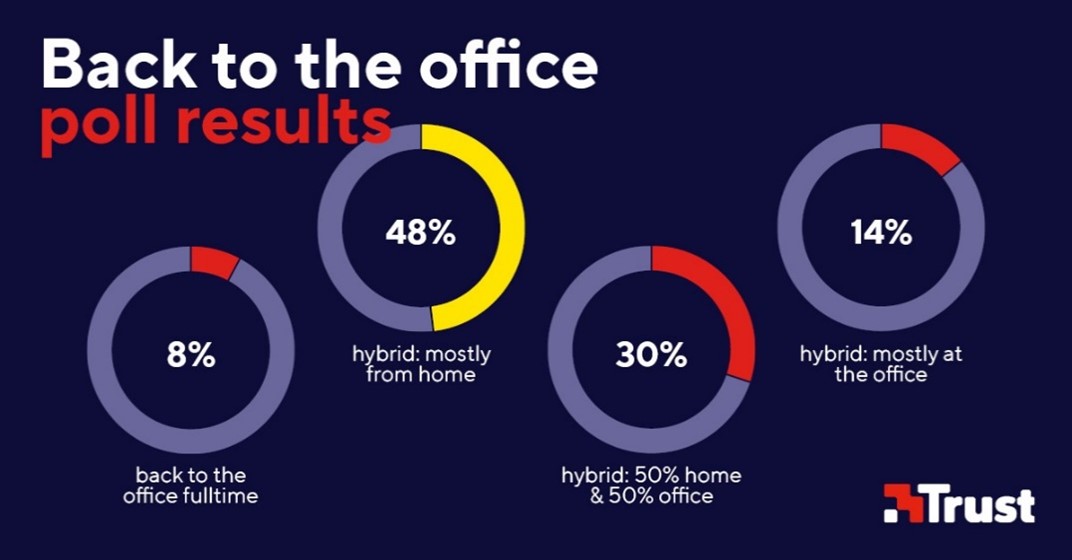Slowly but surely, society is reopening in many countries, and businesses are beginning to make plans to return to the office. It seems that most organisations are working towards a hybrid work model, combining the benefits of working from home and spending time collaborating with colleagues in the office. ‘After 16 months of working in lockdown, it is not simply a matter of picking up where we left off,’ says Wouter Dolle, Director HR & Facilities at Trust International. ‘Similar to when the lockdowns began in 2020, employees again need to get used to a new format and rhythm of working. We need to facilitate them in every way possible, providing tools, technology, and a safe working environment for everyone.’
In March 2020, Trust quickly responded to the lockdowns announced in many of the countries in which the company is located, following the advice and recommendations of the respective governments and adjusting policies accordingly.
‘As the one-stop brand for digital lifestyle accessories, we made sure all employees were able to work remotely, with all the necessary tools, technology, and budget to create a suitable home working environment. For those unable to work from home due to personal circumstances, we provided a safe workplace at our offices’.
With ‘entrepreneurial’ embedded in the company’s core values, employees were able to adapt quickly to the transformation of working from home. ‘Our employees are ambitious, passionate, and committed with a flexible mindset. We often say, ‘You’re not renting the house; you own it’ to indicate the responsibility employees have towards the company and colleagues, as employees often treat a ‘rental’ a bit less carefully. We trust employees to do their job independently. That doesn’t mean it has all been easy during lockdown, however. Whilst employees have been able to adapt to the online working from home format, social interaction and collaboration with colleagues are also very important for employee health and well-being. Therefore, it’s essential that employers and HR teams enable employees to safely meet up at the office again, now that COVID-19 measures as easing up and economies are reopening step by step.’
Dividing time between home and the office
A recent LinkedIn poll conducted by Trust International indicates that hybrid work is what the immediate post-COVID-19 future will hold. Employees returning to the office full-time will seemingly become a rarity. The largest group voted for hybrid work, either mostly from home or a 50-50 split of time between home and office.
From an HR perspective, companies are faced with new challenges in the hybrid return of their employees to the workplace. Should employees notify their employers when they plan to come into the office? With flex desks being normal in many offices, should employees now be seated at a designated desk? Do employees need to take a COVID-19 test before coming in, as they are not obliged to tell their employer if they are vaccinated? Employers, meanwhile, remain responsible for a providing their employees with a safe working environment, but unlike wearing safety shoes, for example, they cannot instruct employees to get vaccinated.
HR teams faced with challenges
Wouter also sees other challenges that HR teams will face. ‘What about employees who are hesitant to come to the office due to health reasons or because they’re scared? What about those who have “overworked” themselves during lockdown and are one step away from a burnout? We all have a responsibility to help employees set their boundaries and get them up to speed in the new reality.’
There’s also the administrative side of things. In the Netherlands, for instance, the monthly ‘work from home allowance’ will partly revert to the ‘commuting allowance’. In the hybrid work format, employees will probably no longer have fixed office days. If this is indeed the case, how do you properly register this without becoming tied up in red tape? Sick leave numbers will probably decline in the post-COVID-19 era, as employees will simply work from home in case of slight illness or cold. This could result in a distorted view of employee health figures.
Although the lockdown proved that it is possible to select and recruit candidates online, recruiters will be pleased that job interviews can once more take place face-to-face. However, what if the job applicant feels ill on the day of the interview? Will they call to reschedule, or will they come in regardless because they are eager to get the job? Can companies demand a rapid COVID-19 test from a candidate?
There are many potential issues that HR needs to consider, but on the other hand, we are living in exciting times for anyone in this profession, as there is great opportunity to contribute to empowering employees in your organisation,’ says Wouter.
Back to the office at Trust
With the Dutch government adjusting its COVID-19 measures at the end of June, Trust employees are now returning to the office in Dordrecht for 1-2 days a week. In the near future, this will likely change to around 50-60% of working days.
‘We will continue to keep 1,5 meters distance from each other, in every space and in everything we do,’ Wouter says. ‘Whilst face masks are no longer mandatory in the Netherlands, we do offer them to anyone who prefers to use them. We’re also allowing external visitors (customers and recruitment candidates) to the office again, but only after registration at reception.
Video conferencing solution for hybrid meetings
‘Our ICT team has equipped meeting rooms with our own video conferencing equipment,’ Wouter says. ‘It’s called IRIS and it is a great asset to hybrid meetings. It has great image resolution and a wide-angle view that offers a full-body display of every person in the meeting room without them having to sit shoulder-to-shoulder. This way, Trust staff and clients have the freedom to work together optimally, while maintaining a safe distance from one another.
Wouter also emphasises that all employees should be responsible in performing their duties and making the right personal choices in the new way of working.
‘It’s not very useful to commute all the way to the office and sit in a room on your own to catch up on your email or administration. Some tasks are more suitable to perform from home, combined with digital meetings. Others, meanwhile, might require a face-to-face or hybrid work experience. Of course, employees need to stay at home when there is a risk of contamination, or if they don’t feel well. I strongly believe in employees taking initiative, and it is our role to encourage and facilitate them in doing so. Ultimately, it’s a two-way conversation between managers and employees to find the right balance in hybrid work.’

